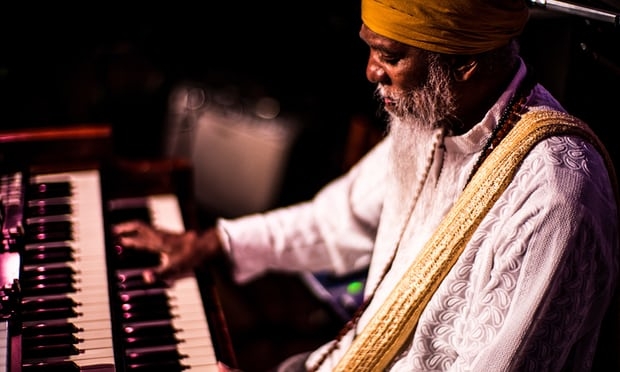In the fourth and final Sunday evening Jazz Club of the Gilmore Festival at WMU’s Williams Theatre, Dr. Lonnie Smith got funky, churchy and just a little bit nasty, showing his unparalleled mastery and improvisational stylings with the Hammond B3 electric organ and more in a delightful performance full of fun surprises.
Whether you think you know Lonnie Smith or not, you’ve undoubtedly heard him sampled by hip hop artists, from the Beastie Boys to Wu-Tang Clan. That’s his infectious riff in Tribe Called Quest’s “Can I Kick It?”
And last night’s performance was a wonderful opportunity to fully absorb the wild range and possibility not only of Smith’s artistry and improvisational skill, but also how he stretches what a keyboard can do.
Most jazz trios in the festival play for about an hour, but Smith, along with Jonathan Kreisberg on guitar and Xavier Breaker on drums, played a dazzling hour-and-45-minute set that began and ended with long runs full of tempo and mood shifts reminiscent of a very masterful mini jam band concert — as if the Grateful Dead and Sly and the Family Stone just happened to rock out and chill together with just the right amount of funk in a very polite and slightly formal house party.
Smith performed center stage, like a beam of light facing the audience from behind the organ in a champagne dashiki with his trademark white turban and long white beard. He flashed a megawatt smile from time to time and rhythmically shrugged his shoulders, accompanying his playing with complementary vocals, sometimes indecipherable, sometimes little chuckles, and other times with discernible lyrics — every now and then with arms and hands flying and mouth open to magnificent dramatic effect.
Smith, 75, yet utterly ageless, has been wowing audiences for more than 50 years. He has said the organ is an extension of himself, and that’s exactly how it felt to be in the presence of his live performance.
In addition to the Hammond, Smith manipulated a synthesizer to mimic strings, horns and even whistles, at times creating sweeping cinematic melodies and what sounded like the score to a sci-fi flick or an old video game. Amid the improv, snippets of recognizable melodies from musicals and blues standards emerged. Smith played standing, sitting and even came out from behind the keyboards to walk through the crowd, playing his custom slap-stick walking cane like a chapman stick without strings.
At moments during the performance, Smith took a backseat to Kreisberg as he took the lead with, at turns, gorgeous classical technique and funk, rock, and jazz riffs on the guitar. Breaker also came in force with his drums, but also brought it down with cool brush patterns on the snare. He also led a militaristic march in “The World Weeps.” Introducing the sweetly melancholic song, Smith said, “We all know what that is. We are having a hard time, but we still get on with it.” From a somber start, the guitar melody gave way to a blues riff that surrendered to a climactic heavy and high organ with a little glorious tremble. Smith smacked and dominated the keyboard, making it cry out as if in defiance of that which is intolerable in the world.
The musicians bowed as if in prayer to the wild audience applause, and generously offered an encore. “Something nice and easy. So you can sleep tonight,” Smith said. It began with a bluesy guitar solo then the organ and drums swelled in a soulful reverence to a huge sound and climactic moment before Smith mouthed the words, “Baby, please don’t go,” as if reading the minds of his audience.
Dr. Lonnie Smith
Williams Theatre
May 6
thegilmore.org





